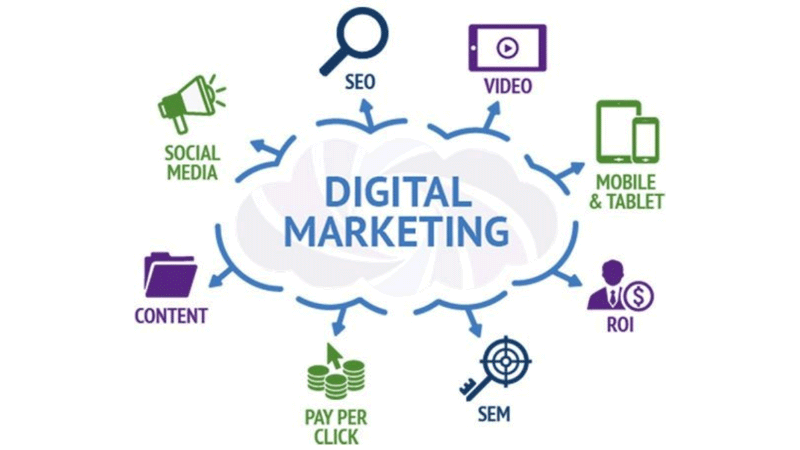The Power of Reaching Your Audience in the Modern World
In today’s fast-paced, hyper-connected world, businesses can no longer rely on traditional marketing methods alone to engage with their audience. The rise of the internet, social media, and mobile devices has transformed the way we interact with brands, making digital marketing an essential part of any business strategy.
Whether you’re a small local business or a large corporation, understanding and leveraging digital marketing tools and strategies is key to staying competitive in the modern marketplace. But what exactly is digital marketing, and how can businesses use it to their advantage?
What is Digital Marketing?
Digital marketing refers to any marketing effort that uses the internet or electronic devices to reach consumers. This includes everything from social media marketing and search engine optimization (SEO) to email campaigns and online advertising. Digital marketing connects businesses with their target audiences across multiple channels, allowing them to engage, build relationships, and ultimately drive sales.
In its essence, digital marketing focuses on using digital channels to promote products, services, or brands to an online audience. These channels could be social media platforms, search engines, email, websites, mobile apps, and even influencer partnerships.
Why Digital Marketing Matters
- Wider Reach: Traditional marketing methods such as print ads, TV, and radio commercials limit you to specific regions or audiences. Digital marketing, on the other hand, allows businesses to reach a global audience at a fraction of the cost. Whether you’re promoting a local product or a global service, digital marketing breaks geographical boundaries.
- Cost-Effectiveness: For small businesses, digital marketing provides an affordable way to compete with larger competitors. With a targeted strategy, even a small ad spend can generate impressive results, offering a higher return on investment (ROI) compared to traditional methods like billboards and TV ads.
- Targeted Campaigns: One of the most powerful advantages of digital marketing is the ability to precisely target your audience. Using data analytics, businesses can craft highly specific campaigns that reach the right people at the right time. Whether through demographics, interests, or behaviors, digital marketing allows you to pinpoint who you’re trying to reach.
- Measurable Results: Unlike traditional marketing, digital campaigns are highly measurable. Businesses can track website traffic, engagement rates, conversions, and more. This data is invaluable in helping businesses optimize campaigns, understand customer behavior, and make informed decisions moving forward.
Key Components of Digital Marketing
1. Search Engine Optimization (SEO)
SEO is the practice of optimizing your website and content so it ranks higher on search engine results pages (SERPs) for relevant keywords. The higher your website ranks, the more likely potential customers will find you when searching for products or services related to your business.
Effective SEO involves keyword research, content optimization, building backlinks, and improving site structure. By aligning your website with search engine algorithms, you can increase organic traffic and visibility.
2. Content Marketing
Content is king. In the digital world, creating valuable, relevant, and engaging content is a cornerstone of successful marketing. Content marketing involves producing blog posts, videos, podcasts, infographics, and other forms of media that resonate with your audience.
The goal is to provide information that educates, entertains, or solves a problem for your audience, while subtly guiding them toward taking an action—whether that’s making a purchase, signing up for a newsletter, or engaging with your brand.
3. Social Media Marketing
With billions of people on platforms like Facebook, Instagram, LinkedIn, Twitter, and TikTok, social media has become one of the most effective ways to connect with your audience. Social media marketing involves creating and sharing content that builds your brand, engages your community, and drives traffic to your website.
Platforms like Facebook and Instagram also offer targeted advertising options that allow businesses to reach specific demographics based on location, interests, behavior, and more.
4. Email Marketing
Email marketing is one of the oldest forms of digital marketing but still one of the most effective. By sending targeted, personalized emails to your subscribers, you can nurture leads, promote products, and keep your audience engaged with your brand.
An effective email campaign might include newsletters, promotional offers, product updates, or event announcements. The key is to deliver value and relevance to your audience while maintaining a strong call to action.
5. Pay-Per-Click (PPC) Advertising
PPC advertising is a model where businesses pay for each click on their ads, usually displayed on search engines or social media platforms. The most common form of PPC is Google Ads, where businesses bid on keywords, and their ads are shown in search results. Other platforms, such as Facebook, also offer PPC advertising opportunities.
PPC can be highly effective for generating leads quickly, especially when combined with solid SEO and content marketing strategies.
6. Influencer Marketing
Influencer marketing leverages the popularity of social media influencers to promote your products or services. By partnering with influencers whose audience aligns with your target demographic, businesses can gain access to a larger, highly engaged audience.
Influencers can provide credibility and trust, and their endorsement can lead to an increase in sales and brand awareness. However, selecting the right influencers and creating authentic partnerships is key to success in this space.
Trends Shaping the Future of Digital Marketing
The digital marketing landscape is constantly evolving, and staying on top of trends is essential for maintaining a competitive edge. Some emerging trends to keep an eye on include:
- Artificial Intelligence (AI): AI is playing an increasingly important role in personalizing user experiences, automating marketing tasks, and analyzing data to drive smarter decisions.
- Video Marketing: Video content continues to dominate, with platforms like YouTube, Instagram Reels, and TikTok making it easy to create and share short-form videos.
- Voice Search Optimization: With the rise of voice-activated devices like Amazon Alexa and Google Assistant, businesses need to optimize their content for voice search queries.
- Chatbots and Automation: Chatbots are becoming an essential tool for customer service and engagement. Automating responses and marketing tasks can improve efficiency and customer satisfaction.
Conclusion
Digital marketing is no longer a luxury—it’s a necessity for businesses that want to thrive in today’s connected world. Whether through SEO, content marketing, social media, or email campaigns, the ability to reach and engage with your audience online offers unprecedented opportunities. The key to success lies in staying adaptable, understanding the latest trends, and continuously optimizing your strategy.
Are you leveraging digital marketing for your business? What strategies have worked best for you? Share your experiences in the comments below!



